This article was co-authored by Robert Dhir, MD. Dr. Robert Dhir is a board certified Urologist, Urological Surgeon, and the Founder of HTX Urology in Houston, Texas. With over 10 years of experience, Dr. Dhir’s expertise includes minimally-invasive treatments for enlarged prostate (UroLift), kidney stone disease, surgical management of urological cancers, and men’s health (erectile dysfunction, low testosterone, and infertility). His practice has been named a Center of Excellence for the UroLift procedure, and is a pioneer in non-surgical procedures for ED using his patented Wave Therapy. He earned his undergraduate and medical degrees from Georgetown University and was awarded honors in pre-medical studies, urology, orthopedics, and ophthalmology. Dr. Dhir served as chief resident during his urological surgical residency at University of Texas at Houston / MD Anderson Cancer Center in addition to completing his internship in general surgery. Dr. Dhir was voted Top Doctor in Urology for 2018 to 2019, one of the top three Best Rated Urologists in 2019 & 2020 for Houston Texas, and Texas Monthly has named him to the 2019 & 2020 Texas Super Doctors Rising Stars list.
There are 36 references cited in this article, which can be found at the bottom of the page.
wikiHow marks an article as reader-approved once it receives enough positive feedback. In this case, 100% of readers who voted found the article helpful, earning it our reader-approved status.
This article has been viewed 956,022 times.
If you have burning, cloudy, or smelly urine, it may be time to check in with a doctor about a bladder infection. These infections, which are also known as cystitis or a urinary tract infection, can be treated quickly with antibiotics.[1] For chronic bladder infections, you may need additional medication and some simple lifestyle changes. Make sure to drink plenty of water and get lots of rest so that you can start feeling better as soon as possible.
Steps
Using Medical Treatment
-
1Visit your doctor if you are worried about a bladder infection. Your doctor can diagnose if it really is a bladder infection or something else.[2] If you can’t get an appointment with your normal doctor, try visiting an urgent care center.[3]
- If you suspect a bladder infection, you can purchase a urinary tract infection home test kit at your local pharmacy.[4]
- You can also check your urine for signs of infection by urinating into a clear glass container and letting it sit for a while. Hold the glass up to the light and look for clouding or sediment. These are both signs of infection.[5]
- Symptoms of a bladder infection include a constant desire to urinate, a burning sensation when you urinate, red or cloudy urine, a foul unusual smell from your urine, or pelvic pain in women.[6] [7]
- If you have a fever, chills, flushed skin, or back pain, the infection may have spread to your kidneys. Get immediate medical care.[8]
- Tell your doctor if you are pregnant or if you could be pregnant.
-
2Undergo a urine analysis to diagnose the infection.[9] Your doctor may ask you to urinate into a cup. Follow your doctor’s instructions for this test. Generally, you will step into the bathroom and clean your genitals using an antibacterial wipe given to you by your doctor. Hold the cup above the toilet as you urinate into it.[10]
- Your doctor may be able to test the sample right in their own office. In some cases, however, they will need to send it off to a lab.
- Some types of bacteria are resistant to certain antibiotics, so your doctor may want to get a culture and sensitivity test done on your urine to be sure you are getting the most effective treatment.[11] Make sure to follow up with them about the results.
Advertisement -
3Take a prescription antibiotic according to your doctor’s instructions.[12] Your doctor will likely prescribe you a pill to take once or twice a day. Although discomfort and burning may clear up in a few days, do not stop taking your antibiotic until you have gone through the full course of medication.[13]
- Women may take antibiotics for as few as 3 days, although pregnant women may need them for up to 2 weeks. Men will usually take antibiotics for 1-2 weeks.
- If you stop taking the medication, the infection could return, and it may be harder to treat.
- Children over the age of 2 months will also be given an antibiotic, although it may come in chewable form. Talk to their pediatrician for more information.[14]
- The most common side effects of antibiotics are nausea and lack of appetite. If you have a rash, shortness of breath, hives, or swelling on your face, see a doctor immediately, as this could be an allergic reaction.[15]
- Severe allergic reactions rarely happen after the first 1-2 doses, although some people may develop a mild reaction (such as a rash) after several doses.
- Some women may develop yeast infections while taking antibiotics.[16] Infants may experience this side effect in the form of diaper rash.[17] Eating acidophilus yogurt while you are on antibiotics may help prevent yeast infections.[18]
-
4Check into the hospital for IV treatment in severe situations. If you develop back pain, chills, fever, or vomiting, your doctor may recommend that you go to the hospital. They will insert an IV into your body to provide fluids and antibiotics. You may be in the hospital for a few days.[19]
- If you experience unusual lower back pain, even without any other symptoms, get immediate medical attention.
- If you are pregnant, your doctor may advise you to go to the hospital if a fever develops.
- If you have another medical condition, such as cancer, diabetes, or a spinal cord injury, your doctor may admit you to the hospital as a precaution.
- An IV may be used for children under the age of 2 months instead of a pill or chewable tablet.[20]
Caring for Your Infection at Home
-
1Ask your doctor or pharmacist if you can take a mild pain reliever. Over-the-counter pain relievers, like ibuprofen or acetaminophen, may reduce pain and discomfort. Don’t take these pain relievers unless you have approval from your doctor or pharmacist, as they may interfere with your medication.[21]
- Always follow the instructions on the label of the pain reliever before taking it.
- Your doctor may prescribe a medication called Pyridium to relieve severe bladder pain and inflammation. Do not take this medication more often or for a longer period than recommended. Pyridium may cause your urine to appear dark orange or red.[22]
-
2Drink more water to flush out the infection. Water will help you urinate and pass the bacteria out of your body. Aim to drink about .5 gallons (1.9 L) of water a day. This is roughly 8 glasses with 8 ounces (230 g) of water each.[23]
- Avoid drinking coffee, alcohol, or caffeinated sodas until you have recovered from your infection.[24]
-
3Try drinking cranberry juice. While research is mixed on this subject, cranberry juice may be able to help fight infection and reduce the acidity of your urine. Try drinking cranberry juice in addition to water for the best results.[25]
- Avoid cranberry juice if you're taking the blood thinning medication Warfarin. The interaction between the juice and the medication may cause bleeding.[26]
- Look for a brand that contains 100% real juice and is sugar free or low in added sugar. High-quality, all-natural juices are best. Check your local health food store, or buy some cranberries and make your own. Look for an unsweetened cranberry juice recipe online.
-
4Place heat against your lower stomach or back to relieve pain. You can use a heating pad, hot water bottle, or a heat wrap. Rest the heat against the sore area. Leave it there for up to 20 minutes.[27]
- To use a hot water bottle, fill the bottle with hot, but not boiling water. Wrap it in a towel before placing it against your body.
-
5Avoid having sex until you have recovered. Sex may worsen your infection or cause discomfort while you are recovering. Wait until you have finished your course of antibiotics or get your doctor’s approval before having sex again.[28]
- Women are especially vulnerable to developing urinary tract infections after sex. You can minimize your chances of getting a bladder infection by always urinating and showering as soon as possible after sex.[29]
Reducing Frequent Bladder Infections
-
1Return to the doctor for additional testing. If you have had 2 or more bladder infections in the past 6 months, there may be an underlying cause that requires treatment. Your doctor may perform additional tests.[30] [31]
- Your doctor may perform imaging tests to see if the anatomy of your bladder is causing frequent infections. These tests include an ultrasound, a computerized tomography (CT) scan, or a magnetic resonance imaging (MRI).
- In severe cases, your doctor may perform a cystoscopy, in which they put a tube up through your urinary tract to see inside of your bladder. The tube will be inserted through your urethra, which is the opening that your urine comes out of when you urinate.
-
2Take a low dose antibiotic for up to 6 months. Take this antibiotic according to your doctor’s instructions. This can treat a current bladder infection and prevent more from developing. If this doesn’t work at first, your doctor may extend the length of treatment.[32]
-
3Use an antibiotic after having sex. If your doctor suspects that sexual activity is causing your frequent bladder infections, they may prescribe an antibiotic for you to take after intercourse. Follow your doctor’s instructions for taking this medication. Typically, these preventative antibiotics come in very low doses, and you will only need to take them once a day.[33]
- Try to urinate after sex as well. This can help prevent bladder infections from developing. It may be helpful for women to urinate standing up, as this can allow your bladder to empty more completely.[34]
- Showering after sex can also help prevent urinary tract infections. However, be sure to shower rather than bathe, since soaking in bath water can increase your risk of infection.[35]
-
4Start vaginal estrogen therapy if you are a postmenopausal woman. Your doctor may prescribe an estrogen cream if you are not using 1 already. This may relieve any burning or itching from a bladder infection. Use the medication according to your doctor’s instructions.[36]
- The cream will usually be applied directly to your vagina. You can use it inside your vagina and also around the outside of your vaginal opening.[37]
- Vaginal estrogen can also come in the form of a pessary, which is a suppository (a small tablet) that you insert directly into your vagina using a plastic applicator.[38]
-
5Urinate often to prevent the infection from returning. If you need to go, don’t hold it in. Get to a bathroom as soon as possible. Afterwards, wipe yourself from front to back to avoid spreading bacteria into your urinary tract.[39]
-
6Stop using irritating feminine products if you’re a woman. Douches, deodorant sprays, and other scented products can irritate your urinary tract. If you get frequent bladder infections, stop using these products. Switch to pads instead of tampons during your period.[40]
Warnings
- If you experience back or side pain, fever, vomiting or chills, call your doctor right away. You may have a kidney infection.⧼thumbs_response⧽
- While bladder infections are more common in women, men can get them too.⧼thumbs_response⧽
- Do not take antibiotics that your doctor didn't prescribe you for your current infection, even if you've been prescribed them in the past.⧼thumbs_response⧽
References
- ↑ Robert Dhir, MD. Board Certified Urologist & Urological Surgeon. Expert Interview. 23 September 2020.
- ↑ Robert Dhir, MD. Board Certified Urologist & Urological Surgeon. Expert Interview. 23 September 2020.
- ↑ https://kidshealth.org/en/teens/uti.html
- ↑ https://www.uspharmacist.com/article/urinary-tract-infections-and-selfcare-options
- ↑ https://sci.washington.edu/info/pamphlets/uti_2.asp
- ↑ https://www.pennmedicine.org/for-patients-and-visitors/patient-information/conditions-treated-a-to-z/urinary-tract-infection
- ↑ https://my.clevelandclinic.org/health/symptoms/12106-pelvic-pain
- ↑ https://www.kidney.org/atoz/content/uti
- ↑ Robert Dhir, MD. Board Certified Urologist & Urological Surgeon. Expert Interview. 23 September 2020.
- ↑ https://scopeblog.stanford.edu/2020/06/04/visiting-the-doctor-for-a-uti-heres-what-you-need-to-know-understanding-utis-part-4/
- ↑ Robert Dhir, MD. Board Certified Urologist & Urological Surgeon. Expert Interview. 23 September 2020.
- ↑ Robert Dhir, MD. Board Certified Urologist & Urological Surgeon. Expert Interview. 23 September 2020.
- ↑ https://medlineplus.gov/ency/article/000521.htm
- ↑ https://www.niddk.nih.gov/health-information/urologic-diseases/urinary-tract-infections-in-children/treatment
- ↑ https://www.nhs.uk/conditions/antibiotics/side-effects/
- ↑ https://www.healthychildren.org/English/health-issues/conditions/genitourinary-tract/Pages/Yeast-Infections-in-Girls-and-Young-Women.aspx
- ↑ https://www.uptodate.com/contents/diaper-rash-in-infants-and-children-beyond-the-basics/print
- ↑ https://www.mountsinai.org/health-library/supplement/lactobacillus-acidophilus
- ↑ https://medlineplus.gov/ency/article/000521.htm
- ↑ https://www.niddk.nih.gov/health-information/urologic-diseases/urinary-tract-infections-in-children/treatment
- ↑ https://www.nhs.uk/conditions/cystitis/treatment/
- ↑ https://www.drugs.com/pyridium.html
- ↑ https://my.clevelandclinic.org/health/diseases/9135-urinary-tract-infections
- ↑ https://uihc.org/health-topics/bladder-irritants
- ↑ https://health.clevelandclinic.org/can-cranberry-juice-stop-uti/
- ↑ https://www.nhs.uk/conditions/anticoagulants/considerations/
- ↑ https://myhealth.alberta.ca/Health/aftercareinformation/pages/conditions.aspx?hwid=tw12428
- ↑ https://www.nhs.uk/conditions/urinary-tract-infections-utis/
- ↑ https://kidshealth.org/en/teens/uti.html
- ↑ https://kidshealth.org/en/parents/recurrent-uti-infections.html
- ↑ https://www.ncbi.nlm.nih.gov/pmc/articles/PMC7824127/
- ↑ https://www.aafp.org/pubs/afp/issues/2010/0915/p638.html
- ↑ https://www.goodrx.com/conditions/urinary-tract-infection/what-really-works-to-prevent-utis
- ↑ https://health.clevelandclinic.org/peeing-after-sex/
- ↑ https://www.princetongyn.com/blog/how-to-prevent-recurrent-utis
- ↑ https://pubmed.ncbi.nlm.nih.gov/31232721/
- ↑ https://www.ncbi.nlm.nih.gov/pmc/articles/PMC3252029/
- ↑ https://pubmed.ncbi.nlm.nih.gov/26992727/
- ↑ https://www.aafp.org/pubs/afp/issues/1998/0515/p2452.html
- ↑ https://www.sciencedaily.com/releases/2018/04/180416121531.htm
- ↑ https://www.aafp.org/pubs/afp/issues/1998/0515/p2452.html
- ↑ https://www.ncbi.nlm.nih.gov/books/NBK557479/
About This Article
To treat a bladder infection, you should go to your doctor for treatment, if you haven’t already. They may ask you to provide a urine sample for an accurate diagnosis. If your doctor prescribes antibiotics to treat your infection, take them as instructed, even if you start feeling better. While you recover, aim to drink 8 glasses of water throughout the day to help flush bacteria out of your body. You can also place a heating pad or hot water bottle against your lower stomach or back to treat any bladder pain you have. To make sure your symptoms don’t get worse, avoid having sex until you’ve recovered. If you develop any back pain, chills, fever, or vomiting, go to the hospital, since these symptoms can be serious. For more tips from our Medical co-author, including how to prevent bladder infections in the future, read on!

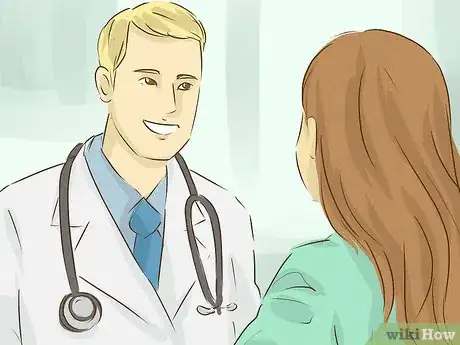
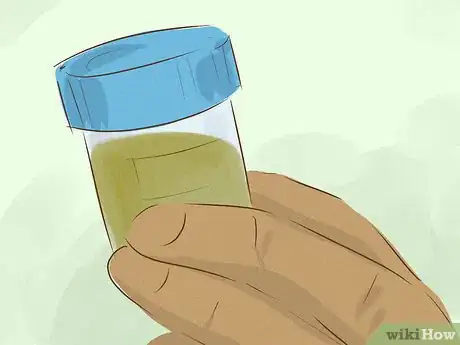
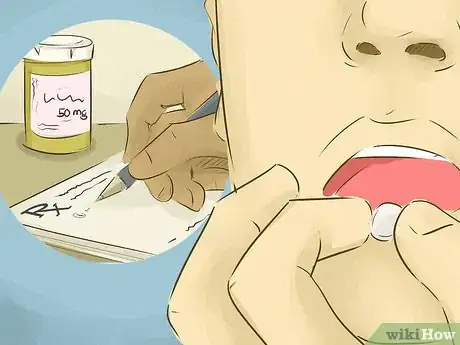
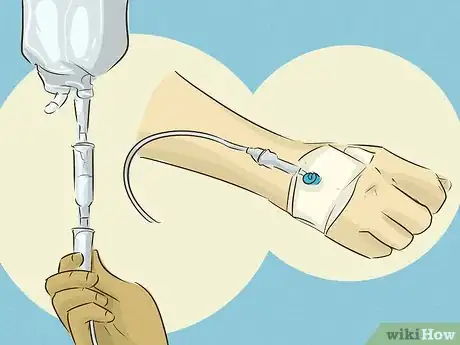
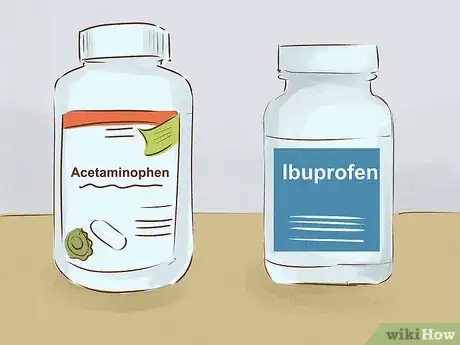

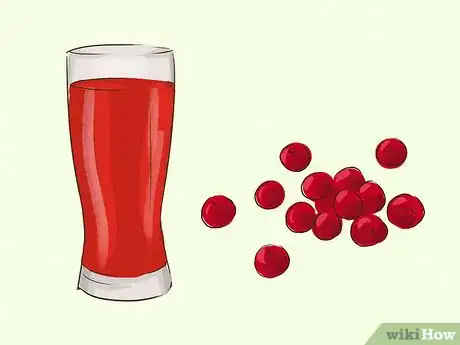
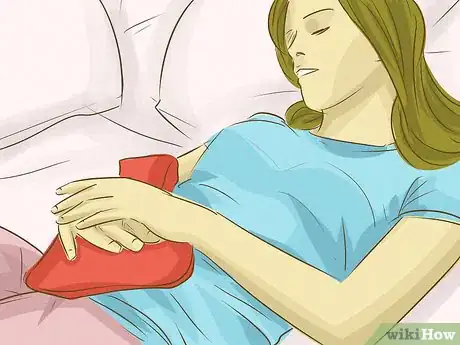
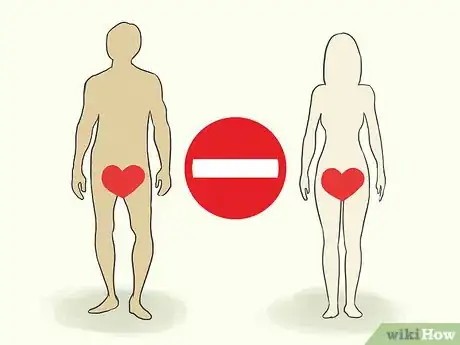
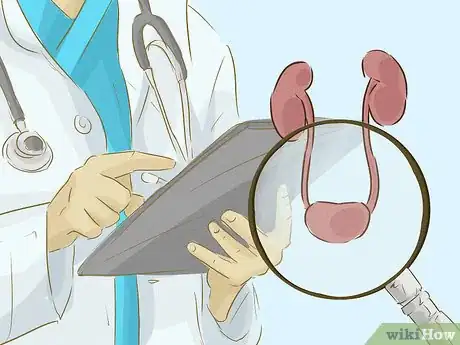
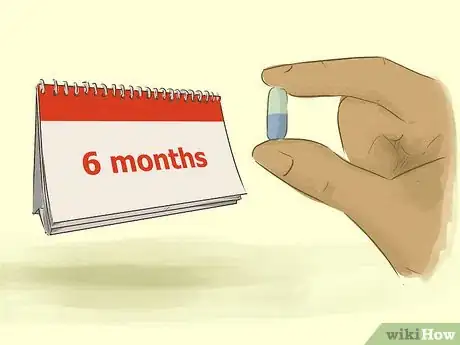
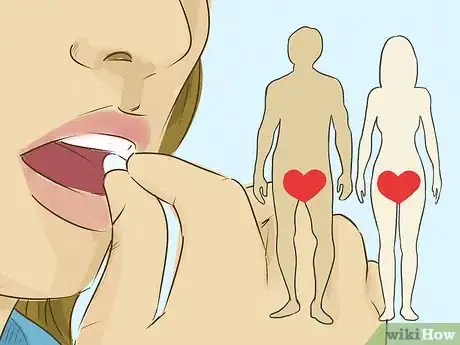

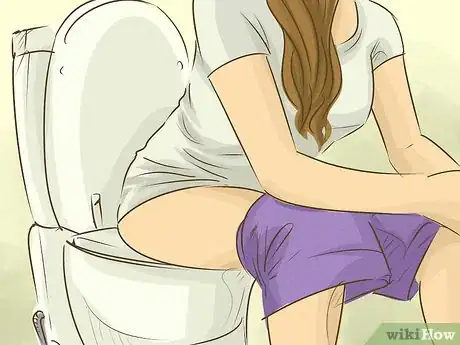
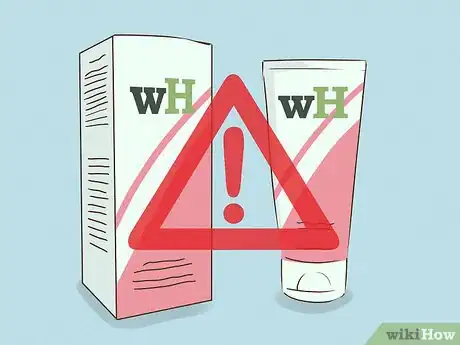


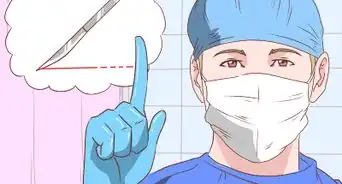

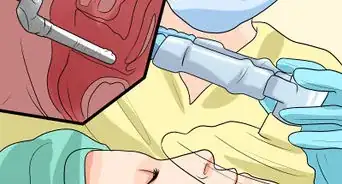
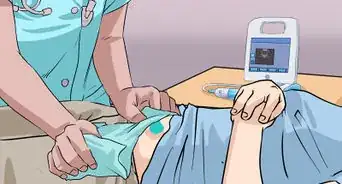
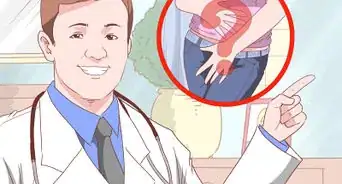

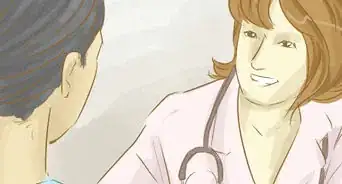
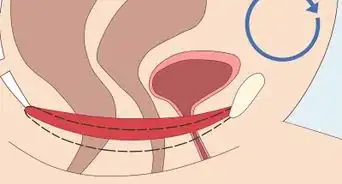
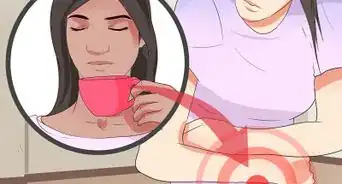

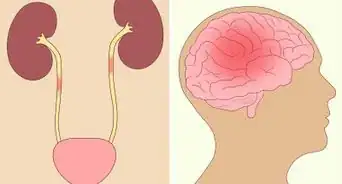











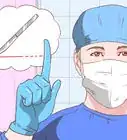




































Medical Disclaimer
The content of this article is not intended to be a substitute for professional medical advice, examination, diagnosis, or treatment. You should always contact your doctor or other qualified healthcare professional before starting, changing, or stopping any kind of health treatment.
Read More...